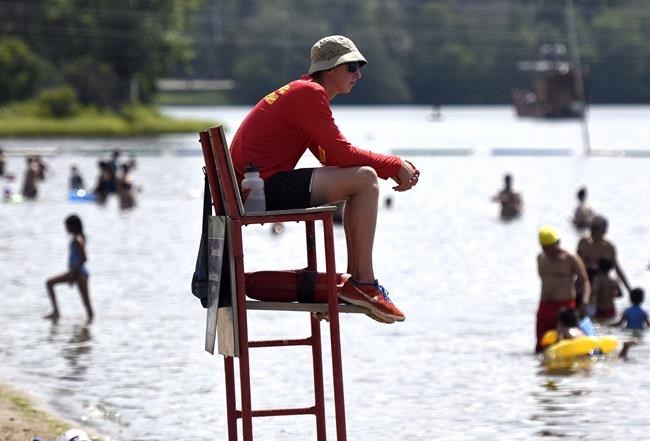Municipalities across Canada are grappling with lifeguard shortages this summer in part due to the lingering impact of the COVID-19 pandemic, officials and industry groups said as city pools and beaches were poised to open for the season.
Health measures meant to curb the spread of COVID-19 put lifeguard certification and recertification programs on hold, and many lifeguards moved on to new opportunities during the pandemic, they said.
The labour shortage is similar to those seen in the retail sector and at airports, said Barbara Byers, a senior research officer at the Lifesaving Society, a water safety organization. "I suspect there will be some pools that will not open this summer because of staff shortages," she said.
Toronto's director of community recreation, Howie Dayton, said the city needs about 1,100 lifeguards to supervise indoor and outdoor pool facilities but currently only has 750 confirmed. Fifty-five outdoor pools in Toronto are set open for weekend and evening swimming on June 25, and open on a full schedule starting June 30.
The city has confirmed 88 per cent of the 300 wading pool attendants it needs and 67 per cent of the 160 waterfront lifeguards required to supervise its beaches, he said.
While daily supervision is being provided at most Toronto beaches based on staff availability, Ward's Island and Hanlan's Point beaches will only be supervised on weekends, while Gibraltar Point will not be supervised until later in the season, he said.
On Tuesday the city cancelled 169 swim courses, saying it could not find swim instructors to teach. The cancellations affected approximately 1,140 participants, the city said.
"Every effort was made to minimize cancellations and, where possible, staff are combining programs with low registration numbers and allocating staff to higher-demand programs," municipal officials said in a statement.
The city is working to fast-track instructor training throughout the summer and planning additional courses for the remainder of the year, the statement said.
In Kitchener, Ont., about 180 to 200 lifeguard and aquatic staff are needed, but the city currently has between 150 to 160 positions filled, its manager of aquatics said.
While there are enough workers to operate at regular capacity and offer the usual programming, Patrick King said he fears the city will continue to lose staff to new opportunities or reduced availability.
Moving forward, it will be a challenge to find and retain instructors to deliver certification courses, King said.
"This isn't just going to be a summer thing, I think this will be over the next two years," he said. "We are working really hard together to try and mitigate those challenges, and the hope is that the public will experience minimal disruption or won't notice much of a difference."
Nova Scotia is also seeing staffing shortages in low-population and rural beaches in the Halifax region, but most beaches in the province will be supervised throughout the summer, said Paul D'Eon, director of the Nova Scotia Lifeguard Service.
He said the organization is about three lifeguards short of its usual number "so between people working a few extra shifts and supervisors picking up some shifts ... the public will be safe this summer."
Byers, of the Lifesaving Society, said she is most concerned about pools in low-income neighbourhoods where children are less likely to go camping often or have family cottages to escape to in hot weather.
"Those pools are everything for those kids," she said. "It's a much healthier, more enjoyable way for kids to enjoy their summer than being in their apartments."
She added that pay rates for lifeguards should be examined to ensure they reflect the level of training and investment that can go into getting certified.
The municipality of West Vancouver recently introduced a free lifeguard training program to fill vacant positions and remove cost barriers associated with certification, which can cost close to $1,000 and take up to two years.
The waterfront community's water facilities haven't been able to fully open for the past few months, closing early on Saturdays and any other day that staff can't come in, according to Jill Lawlor, senior manager of community services.
Before the pandemic, West Vancouver typically had 100 lifeguards going into the summer, but only had 32 this year at the start of their recruitment for the season.
"Knowing how expensive everything is right now, for someone to pay $1,000 for certification ... that can be a barrier for people trying to make a commitment or decision to become a lifeguard," she said.
Two hundred people applied for the new program, compared to only three or four when Lawlor first started recruiting, she said. Those who complete the program go through a job interview on the last day of the course and some will be offered jobs, she said.
"It's really important that people know what a wonderful experience lifeguarding can be and that it can teach a number of judgment, decision-making and teamwork skills," said Lawlor.
"Whether you're a high school or university student or a parent that is looking for part-time (work), or even someone who's retired just looking for an opportunity, it's a great job at any time in your life."
This report by The Canadian Press was first published June 24, 2022.
Tyler Griffin, The Canadian Press

